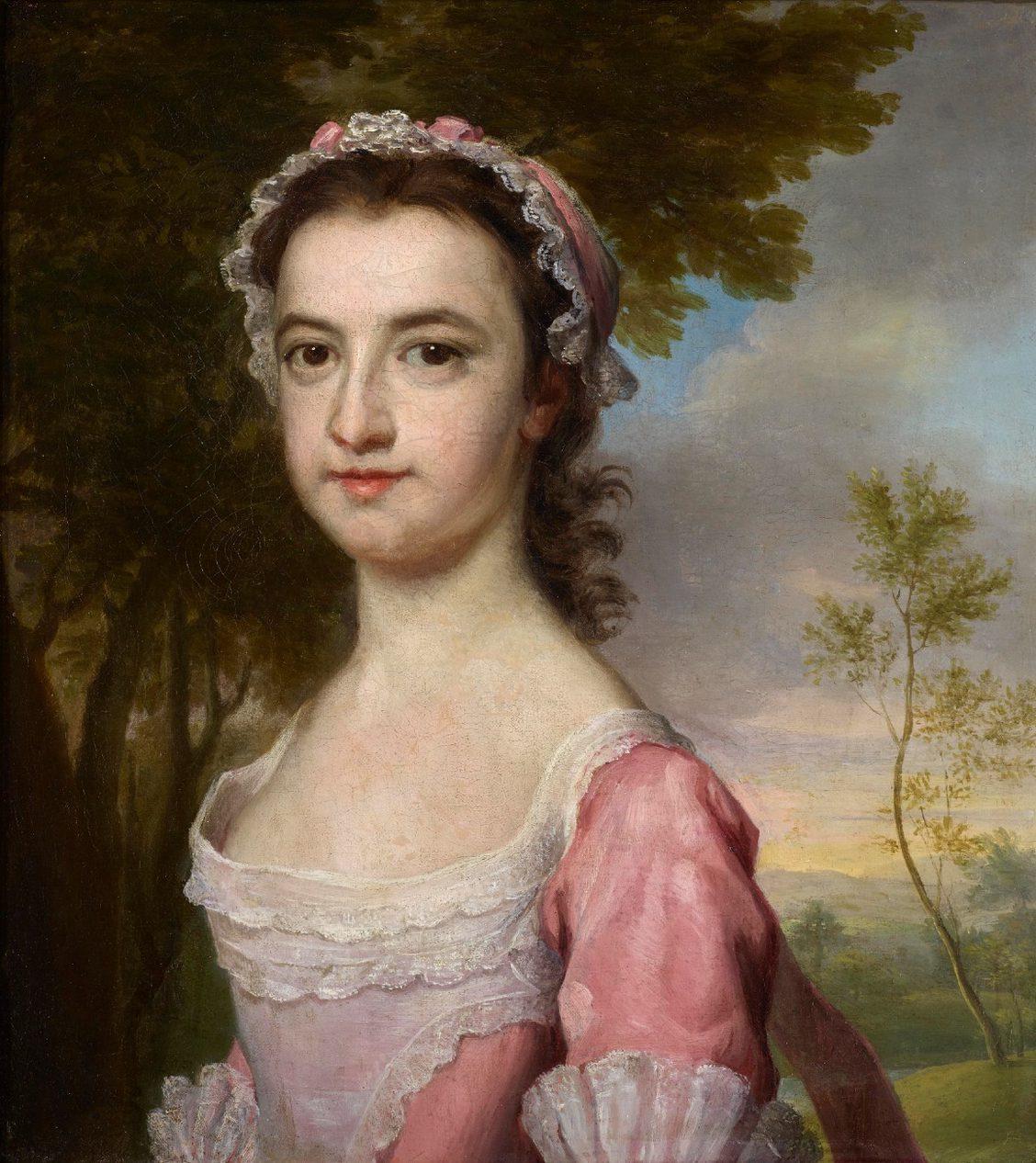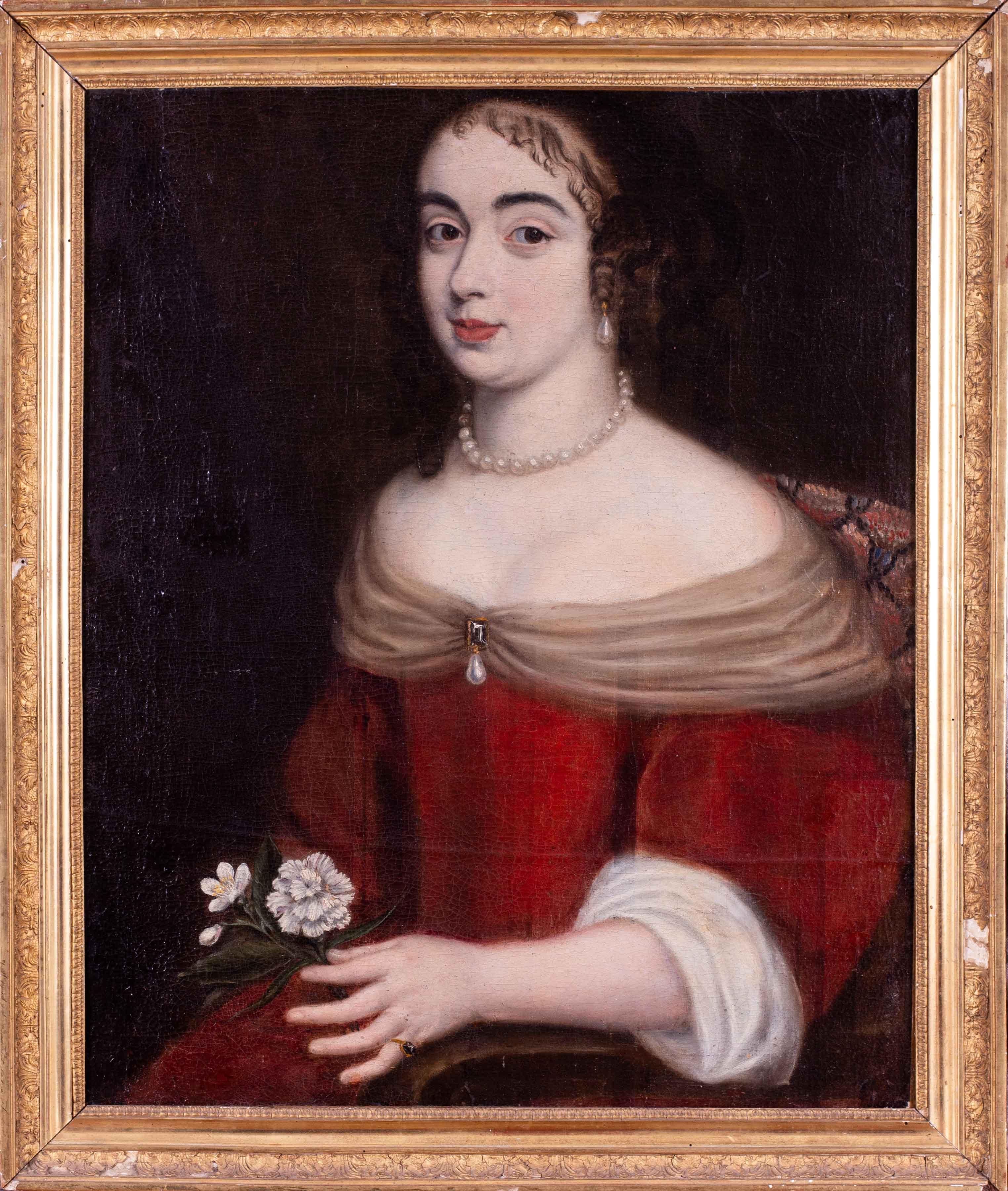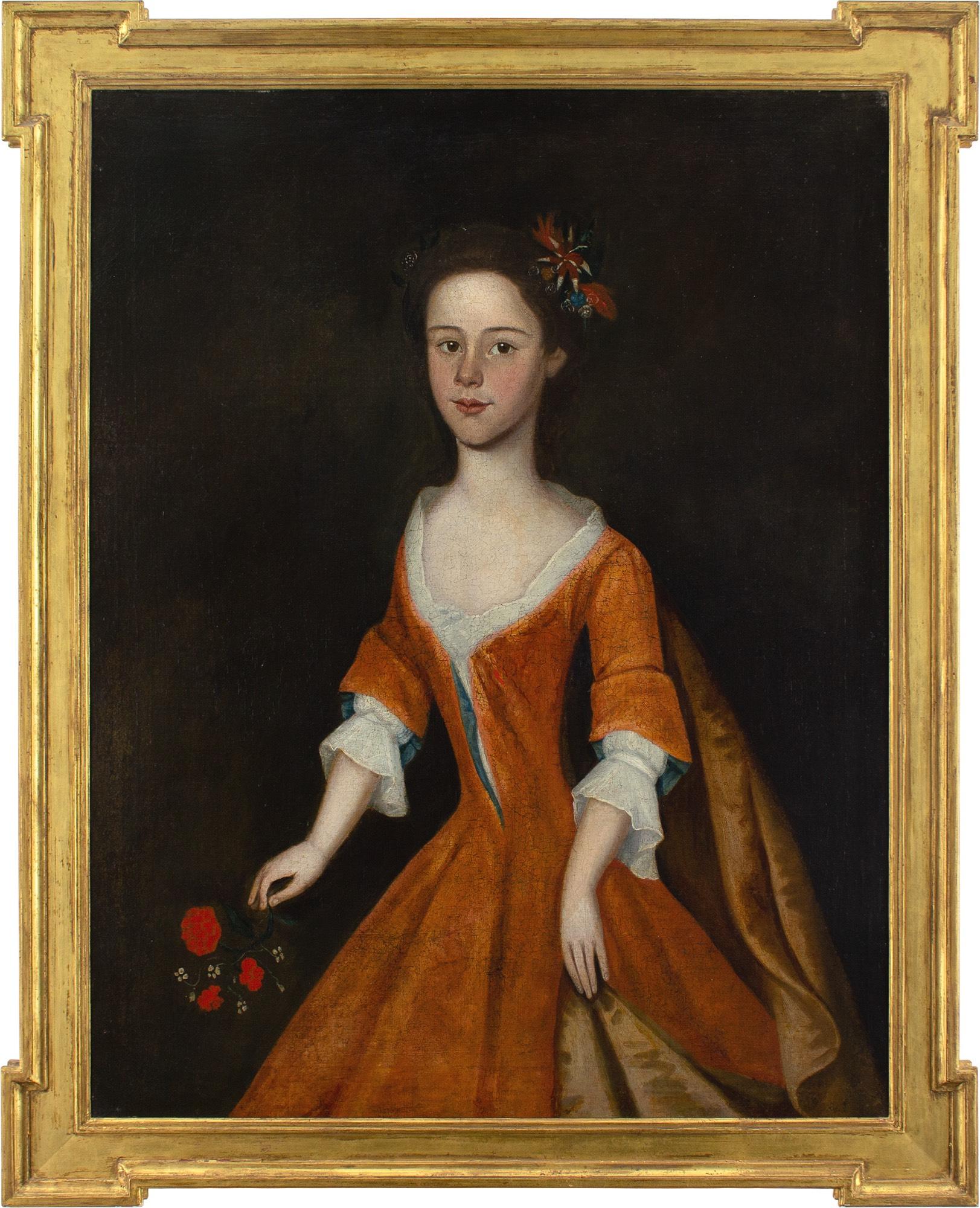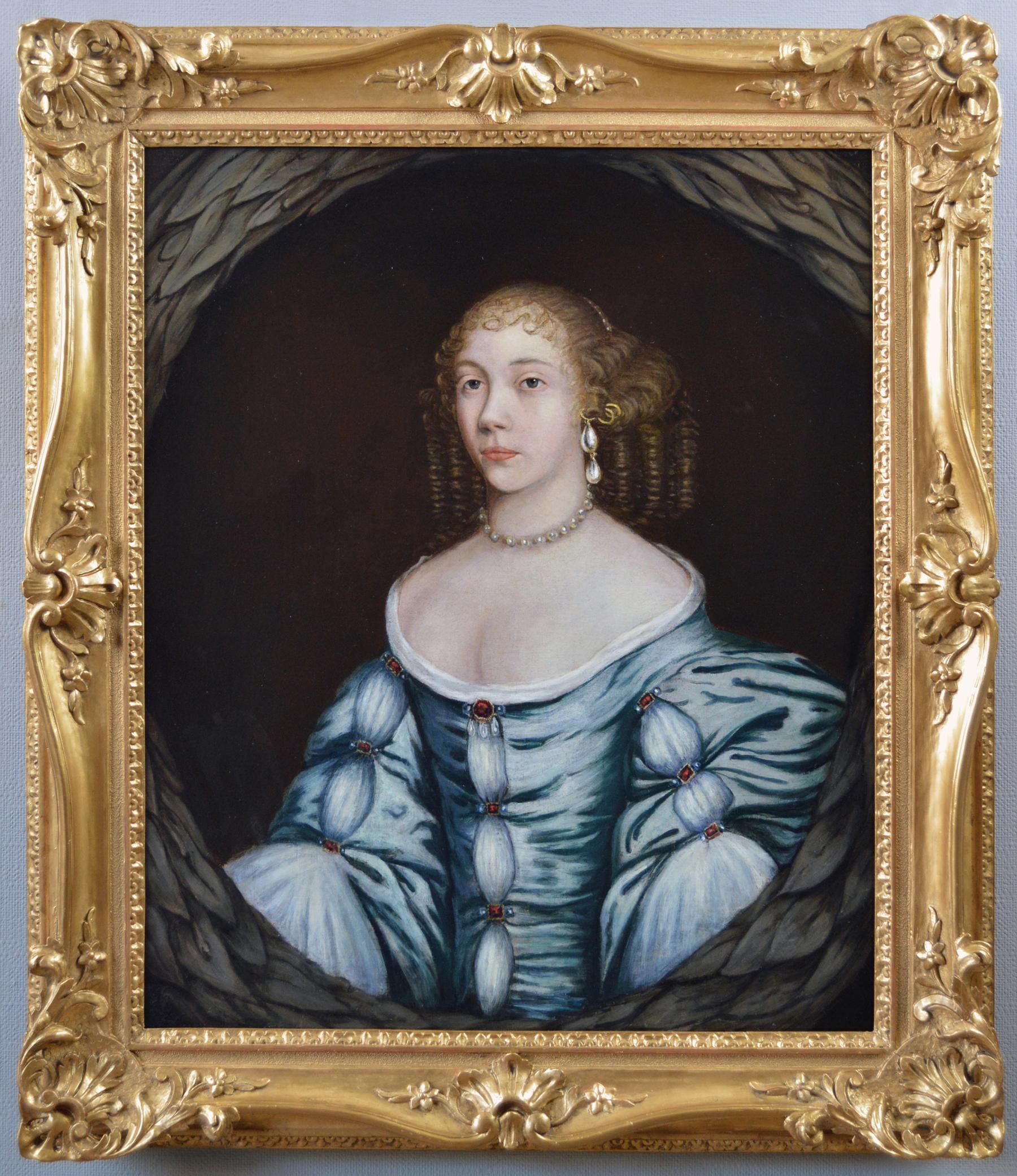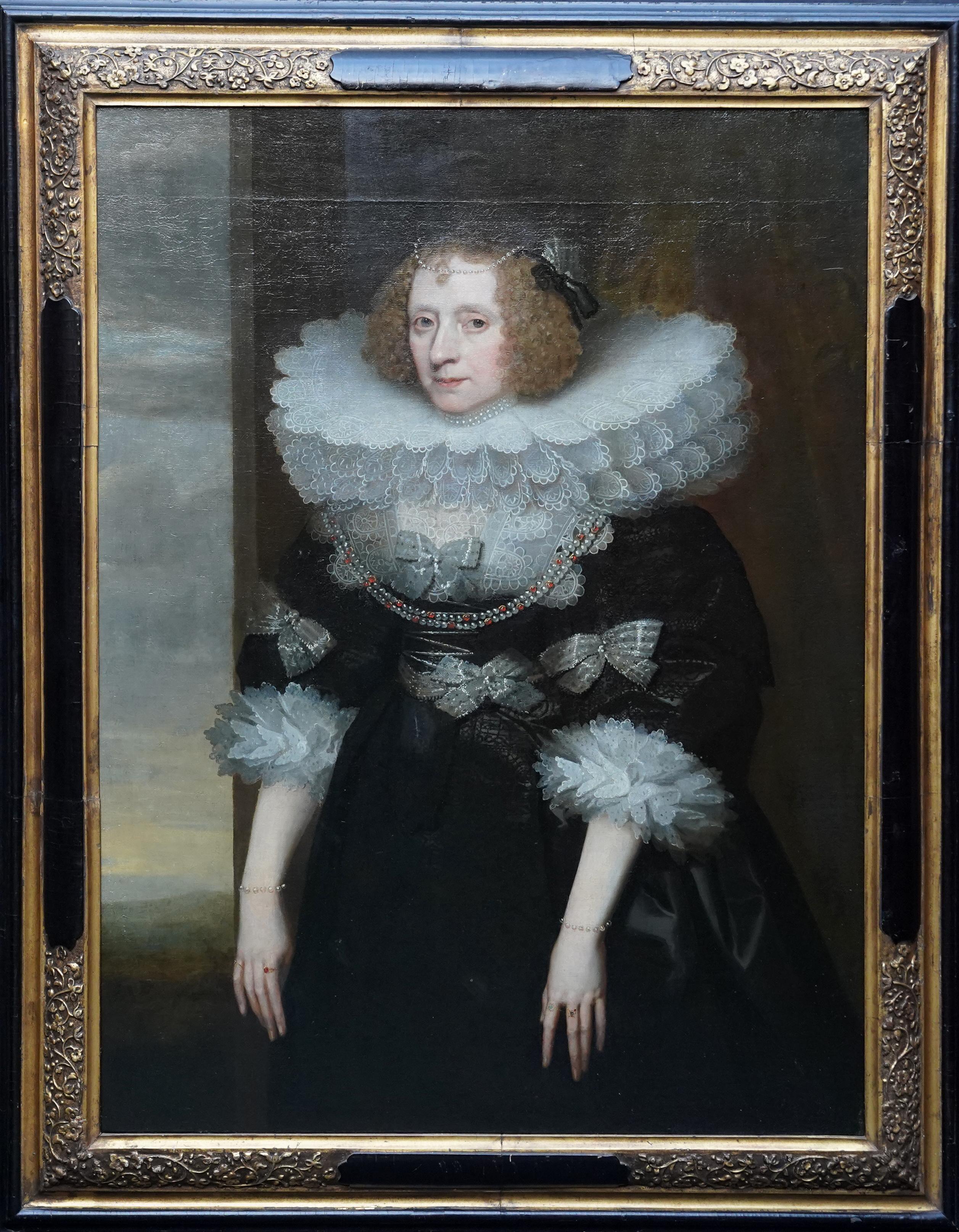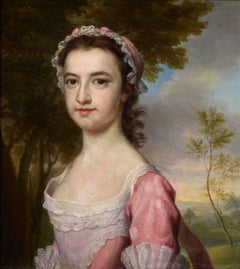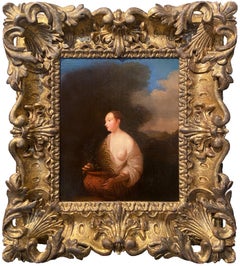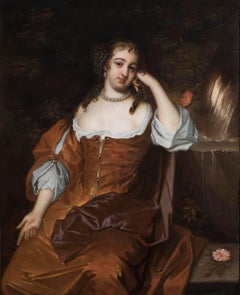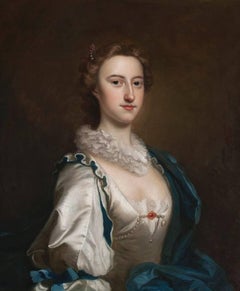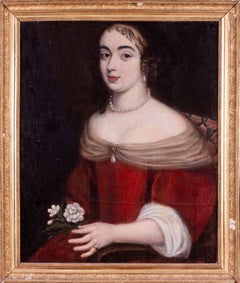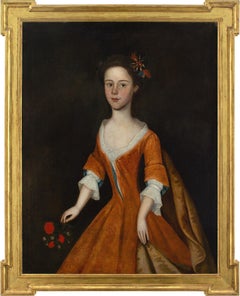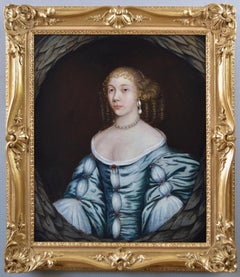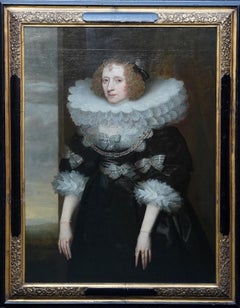Items Similar to Portrait of a Girl, 17th Century English School Old Masters Oil
Video Loading
Want more images or videos?
Request additional images or videos from the seller
1 of 9
Gilbert JacksonPortrait of a Girl, 17th Century English School Old Masters Oil1620's
1620's
$98,723.08
£72,000
€83,972.07
CA$135,185.66
A$150,308.06
CHF 78,482.58
MX$1,829,615.08
NOK 1,001,403.48
SEK 938,267.21
DKK 626,699.04
Shipping
Retrieving quote...The 1stDibs Promise:
Authenticity Guarantee,
Money-Back Guarantee,
24-Hour Cancellation
About the Item
Gilbert Jackson
English Active: 1620 - 1650
Portrait of a Girl
Oil on panel, signed upper left and Inscribed upper right
Image size: 24 ½ x 20 inches
Contemporary style hand made oak frame
This charming portrait displays many of the features attributed to Jackson. The sumptuous scarlet of her gown and teal background was also a recurring feature as his portraits often demonstrated a noticeably strong use of colour.
Other features of Jackson’s work are the detailed way in which he depicts costume and, in particular, his bold use of colour. Here the artist has chosen a teal background, which is strikingly bright next to sumptuous scarlet of the sitter’s gown and the ribbon in her hair. Jackson’s skill is evident in his handling of the light as it catches the lace on the dress and passes through the fine material of the intricate collar, and in the way that he brings across the light, wispy texture of the girl’s hair in contrast to the hard, smooth surface of the pearls at her ears and around her neck.
An inscription at the top of the painting gives us part of the artist’s signature, (upper left), as well as the initials and age of the sitter, (upper right). The sitter aged 14 is most likely the daughter of a noble family, painted during one of the artist’s trips outside London.
- Creator:Gilbert Jackson (1620 - 1650, British)
- Creation Year:1620's
- Dimensions:Height: 24.5 in (62.23 cm)Width: 20 in (50.8 cm)
- More Editions & Sizes:1 of 1Price: $98,723
- Medium:
- Movement & Style:
- Period:
- Condition:
- Gallery Location:London, GB
- Reference Number:1stDibs: LU5244901592
About the Seller
5.0
Vetted Professional Seller
Every seller passes strict standards for authenticity and reliability
Established in 2007
1stDibs seller since 2014
82 sales on 1stDibs
Typical response time: 2 hours
- ShippingRetrieving quote...Shipping from: London, United Kingdom
- Return Policy
Authenticity Guarantee
In the unlikely event there’s an issue with an item’s authenticity, contact us within 1 year for a full refund. DetailsMoney-Back Guarantee
If your item is not as described, is damaged in transit, or does not arrive, contact us within 7 days for a full refund. Details24-Hour Cancellation
You have a 24-hour grace period in which to reconsider your purchase, with no questions asked.Vetted Professional Sellers
Our world-class sellers must adhere to strict standards for service and quality, maintaining the integrity of our listings.Price-Match Guarantee
If you find that a seller listed the same item for a lower price elsewhere, we’ll match it.Trusted Global Delivery
Our best-in-class carrier network provides specialized shipping options worldwide, including custom delivery.More From This Seller
View AllPortrait of a Girl, 18th Century Oil Old Master
By George Knapton
Located in London, GB
George Knapton
1698-1778
Portrait of a Girl
Oil on canvas
Image size: 20 x 18 inches
Original giltwood frame
This beautiful half length portrait of a young woman, turned to left, gazing at the spectator, wearing a pink, white lace-embroidered, dress, in her hair a pink bonnet trimmed with lace to match her dress.
The depiction of a young girl epitomises child portraiture of the late eighteenth century, in which painters such as William Beechey, Joshua Reynolds, Thomas Gainsborough had begun to discover and express the true character of children, in contrast to the stiff, miniature-adults of previous generations.
The Artist
Knapton was born in Lymington, one of four sons of James Knapton. He was apprenticed to Jonathan Richardson from 1715 to 1722, and in 1720 was a founding subscriber to the academy of St. Martin's Lane established by Louis Chéron...
Category
18th Century Old Masters Portrait Paintings
Materials
Canvas, Oil
Portrait of a Young Woman with Vase, Oil on canvas, Early Dutch Genre Painting
Located in London, GB
Oil on canvas
Image size: 12 x 10 inches (30.5 x 25.5 cm)
Period hand carved gilt frame
This 17th century Dutch genre painting depicts a young woman holding a jug with a landscape l...
Category
17th Century Dutch School Figurative Paintings
Materials
Canvas, Oil
Portrait of a Lady, 17th Century Flemish Oil Old Masters
By Jacob Huysmans
Located in London, GB
Jacob Huysmans
Flemish 1633 - 1696
Portrait of a Lady
Oil on canvas
Image size: 49 x 40 ¼ inches
Gilt frame
Huysmans was born in Antwerp and came to England during the reign of Charles II where he became one of the fashionable painters of the court.. The diarist Samual Pepys noted the artist as capable of a more exact likeness than Lely. Certainly the diarist records that by August 1664 in the circle of Queen Catherine...
Category
17th Century Old Masters Portrait Paintings
Materials
Canvas, Oil, Acrylic
Portrait of a Lady, Old Masters 18th Century Oil
By Thomas Hudson
Located in London, GB
Thomas Hudson
1701 – 1779
Portrait of a Lady
Oil on canvas
Image size: 30 x 25 inches
Original carved giltwood frame
Hudson had many assistants, and employed the specialist drapery ...
Category
18th Century Old Masters Portrait Paintings
Materials
Canvas, Oil
Portrait of Lady Mansfield of Ringwood
By Thomas Hudson
Located in London, GB
Portrait of Lady Mansfield of Ringwood
Oil on Canvas
Image size: 25 x 30 inches (63 x 76 cm)
Original carved & gilded frame
POA
Provenance
Descended through the Family Estate
The y...
Category
18th Century English School Paintings
Materials
Canvas, Oil
Portrait of Lady Mansfield of Ringwood
By Thomas Hudson
Located in London, GB
Portrait of Lady Mansfield of Ringwood
Oil on Canvas
Image size: 25 x 30 inches (63 x 76 cm)
Original carved & gilded frame
POA
Provenance
Descended through the Family Estate
Born in Poland in 1760 to the 2nd Earl of Mansfield and his wife, Elizabeth Mary Murray would later come under the care of her uncle, William Murray (1st Earl of Mansfield) at Kenwood House in Hampstead. David Murray (2nd Earl of Mansfield) was set to inherit the title and full wealth of his uncle, including Kenwood House. Lady Mansfield’s second cousin would soon join her at Kenwood, where they would be raised together and featured in multiple portraits of the time. Her younger sister, Henrietta, is seen in a separate portrait done by Thomas Hudson as well. At the age of 25 she married George Finch-Hatton, an English aristocrat and politician who sat in the House of Commons from 1772-1784.
Gazing out at the viewer, Lady Mansfield wears a decorated dress, with an abundance of pearls and lace, and a transparent gold lined veil surrounding her right shoulder. The excess of luxurious fabric matches another Hudson portrait of another Lady Mansfield, with the lace detailing and complementary bodice. The depiction of this Lady Mansfield epitomizes the style of portraiture in the 18th century, such as the styles Hudson’s pupils Joshua Reynolds, Joseph Wright, and Peter Toms. From Hudson’s travels to the Low Countries and Italy, he no doubt brought back artistic inspiration from the international pieces he encountered.
Thomas Hudson
Hudson was a celebrated 18th century portrait painter. Born in Devon in 1701 he studied under the artist Jonathan Richardson and married his daughter, against Richardson’s wishes.
He had many artistic friends including William Hogarth and Francis Hayman and travelled with them in Europe in 1748. He also visited Italy with the sculptor Louis-François Roubiliac in 1752. Hudson’s style of portraiture proved so successful that for a decade from 1745 to 1755 he was London’s most popular portrait painter and made a fortune painting the cream of London society and members of the Royal Family.
He was also a talented teacher, perhaps too good, as subsequently a number of his former assistants overtook him in popularity including the artist Joshua Reynolds.
Hudson retired in the late 1750’s and died in Twickenham in 1779. His most notable works include portraits of King George II and George Friedrich Handel and his “Portrait of a Nobleman in Van Dyck dress.” Many of Hudson’s works may be seen in art galleries. These include the National Portrait Gallery, the National Maritime Museum, the Tate Gallery, the Foundling Museum and the Bristol City Museum and Art Gallery. His works are also in Museums across the world...
Category
18th Century English School Paintings
Materials
Canvas, Oil
You May Also Like
French School, 17th Century, 'Portrait of the Marquise de Grugieres', oil canvas
Located in Petworth, West Sussex
French school, 17th Century
Portrait of the Marquise de Grugieres
Oil on canvas
26.1/4 x 21.5/8 in. (66.7 x 54.8 cm.)
In a gilded composite frame, later production (possible early 1...
Category
17th Century Old Masters Portrait Paintings
Materials
Canvas, Oil
Mid-18th-Century English School, Portrait Of A Girl With A Posy
Located in Cheltenham, GB
This exceedingly charming mid-18th-century English oil painting depicts a girl wearing a red gown with a train over a white petticoat. She’s holding a posy or nosegay.
Evidently once commissioned for an English country house, the identity of this young lady remains a mystery. Her gown appears to be inspired by the popular ‘robe à la française...
Category
1740s English School Portrait Paintings
Materials
Oil, Canvas
17th Century portrait oil painting of a lady
By Studio of Sir Peter Lely
Located in Nr Broadway, Worcestershire
Studio of Sir Peter Lely
Dutch, (1618-1680)
Portrait of a Lady
Oil on canvas
Image size: 29.25 inches x 24.25 inches
Size including frame: 37...
Category
17th Century Portrait Paintings
Materials
Canvas, Oil
Portrait of Frances Howard Duchess of Richmond - Flemish Old Master oil painting
By Anthony van Dyck
Located in London, GB
This stunning Flemish Old Master portrait oil painting is attributed to circle of Anthony Van Dyck. Painted circa 1630, the sitter is Frances Stewart née Howard (1578 -1639) Duchess ...
Category
Early 17th Century Old Masters Portrait Paintings
Materials
Oil
$52,652 Sale Price
20% Off
Portrait of a Lady - British 17th century art Old Master portrait oil painting
Located in London, GB
This lovely British Old Master portrait oil painting is by noted British Old Master artist James Cranke. Cranke taught George Romney to paint as a small boy, living near by. Painted ...
Category
17th Century Old Masters Portrait Paintings
Materials
Oil
Portrait of the French Princess, late 17th c. French school
Located in PARIS, FR
Portrait of the Princess of Conti - Attributed to Louis Ferdinand Elle the Younger (1648-1717)
Late 17th century French school
Oil on canvas, h. 100 cm, l. 80 cm
Important Louis XIV ...
Category
Late 17th Century Old Masters Portrait Paintings
Materials
Canvas, Oil
